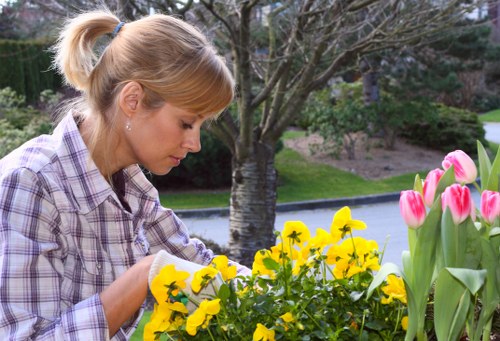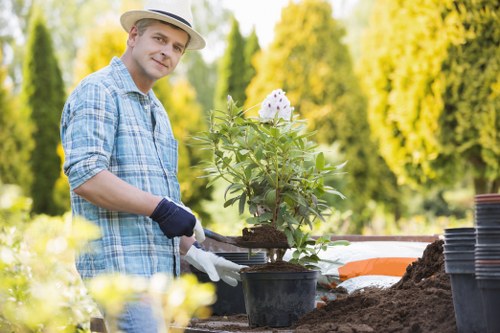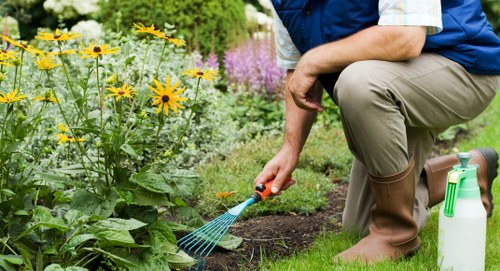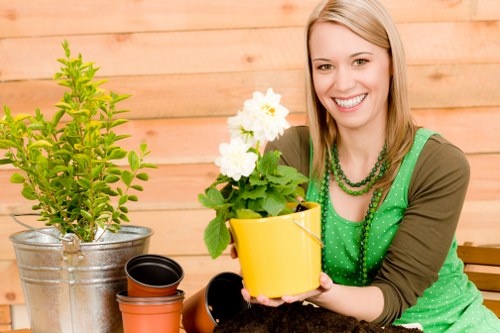Comprehensive Guide to Garden Maintenance in Feltham
Introduction to Garden Maintenance

Maintaining a beautiful garden in Feltham requires dedication, knowledge, and the right practices. Whether you're a seasoned gardener or a novice, understanding the essentials of garden upkeep can transform your outdoor space into a vibrant and inviting sanctuary.
Feltham's unique climate and soil conditions present both opportunities and challenges for gardeners. By tailoring your maintenance routines to suit these specific conditions, you can ensure your garden thrives year-round.
In this guide, we'll explore various aspects of garden maintenance, from soil preparation to plant selection, and provide practical tips to keep your garden in top shape.
Seasonal Garden Maintenance

Effective garden maintenance in Feltham involves understanding and adapting to the changing seasons. Each season brings its own set of tasks that are crucial for the health and beauty of your garden.
Spring Maintenance
Spring is the perfect time to prepare your garden for the growing season. Start by clearing away any debris from the winter months, such as fallen leaves and dead plants.
Pruning is essential in spring to remove any damaged branches and encourage healthy growth. Additionally, fertilizing your soil will provide the necessary nutrients for your plants to flourish.
Planting new seeds or transplanting seedlings in early spring can give your garden a head start, allowing plants to establish strong roots before the heat of summer.
Soil Preparation and Fertilization

Healthy soil is the foundation of a thriving garden. In Feltham, the soil composition can vary, so it's important to test your soil and amend it as needed.
- Soil Testing: Conduct a soil test to determine its pH level and nutrient content. This will help you understand what amendments are necessary.
- Amending the Soil: Add organic matter such as compost or well-rotted manure to improve soil structure and fertility.
- Fertilization: Use balanced fertilizers to provide essential nutrients. Avoid over-fertilizing, as this can harm plants and the environment.
Regularly aerating your soil can also enhance drainage and root growth, ensuring your plants receive adequate water and nutrients.
Plant Selection and Care

Choosing the right plants for your garden is crucial for successful maintenance. Consider the local climate, soil conditions, and the specific needs of each plant.
Suitable Plants for Feltham
Feltham's climate supports a wide variety of plants, including:
- Perennials: Such as lavender, hostas, and peonies, which come back year after year.
- Annuals: Including marigolds, petunias, and zinnias, which provide vibrant colors throughout the growing season.
- Vegetables and Herbs: Like tomatoes, basil, and rosemary, which can thrive in Feltham's gardens with proper care.
Regularly monitoring your plants for signs of stress or disease allows you to address issues promptly, ensuring a healthy and resilient garden.
Watering and Irrigation

Proper watering is essential for garden maintenance in Feltham. Both overwatering and underwatering can lead to plant health problems.
Efficient Watering Practices
Implementing efficient watering practices can conserve water and promote healthy plant growth:
- Time of Day: Watering early in the morning reduces evaporation and allows plants to absorb moisture before the heat of the day.
- Deep Watering: Ensures water reaches the root zone, encouraging deep root growth and drought resistance.
- Mulching: Applying a layer of mulch helps retain soil moisture and suppress weeds.
Consider installing an irrigation system to automate and optimize your watering schedule, ensuring consistent moisture levels for your plants.
Pest and Weed Management
Managing pests and weeds is a critical component of garden maintenance in Feltham. Effective control methods protect your plants without harming the environment.
Natural Pest Control
Using natural pest control methods minimizes damage to beneficial insects and maintains ecological balance:
- Beneficial Insects: Introduce ladybugs, lacewings, and other predators to keep pest populations in check.
- Neem Oil: A natural pesticide that controls a variety of pests without harming plants.
- Companion Planting: Planting certain species together can deter pests and improve plant health.
Weed Management
Weeds compete with your plants for nutrients and sunlight. Effective weed management techniques include:
- Mulching: Prevents weed seeds from germinating and makes it easier to remove existing weeds.
- Hand Weeding: Regularly removing weeds by hand ensures they don't spread.
- Herbicides: Use selective herbicides carefully to target specific weed species without harming desirable plants.
Pruning and Trimming
Essential Pruning Techniques
Pruning is vital for maintaining the shape, health, and productivity of your plants. Proper pruning techniques encourage new growth and prevent diseases.
- Remove Dead or Diseased Branches: Eliminates sources of infection and promotes overall plant health.
- Shape Plants: Maintaining a desirable shape enhances the aesthetic appeal of your garden.
- Encourage Flowering: Regular pruning can stimulate more abundant blooms in flowering plants.
Use sharp, clean tools to make precise cuts, and follow specific pruning guidelines for different plant species to avoid damage.
Lawn Care and Maintenance
A well-maintained lawn is the centerpiece of any garden. In Feltham, proper lawn care involves regular mowing, aeration, and fertilization.
Grass Selection
Choose grass species that are well-suited to Feltham's climate and soil conditions. Common choices include:
- Fescue: Known for its resilience and ability to thrive in various conditions.
- Ryegrass: Offers quick germination and a lush green appearance.
- Bentgrass: Ideal for well-maintained, high-traffic areas.
Lawn Maintenance Tips
To keep your lawn healthy and vibrant:
- Mowing: Keep grass at an optimal height to encourage deep roots and reduce weed growth.
- Aeration: Relieves soil compaction, allowing air, water, and nutrients to reach the roots.
- Fertilization: Apply appropriate fertilizers to provide essential nutrients throughout the growing season.
Garden Tools and Equipment
Having the right tools and equipment makes garden maintenance in Feltham more efficient and effective.
Essential Tools
Invest in high-quality tools to ensure longevity and ease of use:
- Pruners and Shears: For precise trimming and cutting.
- Shovels and Spades: Essential for digging and soil preparation.
- Rakes: Useful for clearing debris and leveling soil.
- Hose and Irrigation Systems: Ensure consistent watering for your plants.
- Wheelbarrows: Facilitate the movement of soil, compost, and plants around your garden.
Equipment Maintenance
Regularly maintain your garden tools to extend their lifespan and ensure optimal performance:
- Cleaning: Remove dirt and debris after each use to prevent rust and corrosion.
- Sharpening: Keep cutting tools sharp for efficient and clean cuts.
- Storage: Store tools in a dry, sheltered area to protect them from the elements.
Professional Garden Maintenance Services
While DIY garden maintenance is fulfilling, hiring professional services in Feltham can save time and ensure expert care for your garden.
Benefits of Professional Services
Entrusting your garden to professionals offers several advantages:
- Expertise: Professionals have the knowledge and experience to handle a variety of garden challenges.
- Time-Saving: Outsourcing maintenance tasks frees up your time for other activities.
- Quality Results: Professional services ensure your garden looks its best with meticulous care.
Choosing the Right Service
Select a reputable garden maintenance service in Feltham by considering:
- Experience: Look for companies with a proven track record in garden maintenance.
- Services Offered: Ensure they provide the specific services you need, such as pruning, mowing, or pest control.
- Customer Reviews: Check testimonials and reviews to gauge customer satisfaction.
- Pricing: Compare quotes to find a service that fits your budget without compromising quality.
Contact us today to learn more about our professional garden maintenance services tailored for Feltham residents.
Sustainable Gardening Practices
Adopting sustainable gardening practices not only benefits the environment but also enhances the health and resilience of your garden.
Composting
Creating a compost pile recycles organic waste into nutrient-rich fertilizer. Compost improves soil structure, retains moisture, and promotes beneficial microbial activity.
- Materials: Use kitchen scraps, garden trimmings, and leaves.
- Maintenance: Turn the compost regularly to aerate and speed up decomposition.
- Usage: Apply compost to garden beds to enrich the soil.
Water Conservation
Implementing water-saving techniques ensures your garden remains lush while minimizing water usage:
- Drip Irrigation: Delivers water directly to plant roots, reducing evaporation and runoff.
- Rainwater Harvesting: Collects and stores rainwater for garden use.
- Drought-Resistant Plants: Choose plants that require less water and are adapted to local conditions.
Seasonal Planting and Harvesting
Understanding the best times for planting and harvesting ensures optimal growth and productivity in your garden.
Planting Schedules
Follow planting schedules tailored to Feltham's climate to maximize your garden's potential:
- Spring: Plant vegetables like peas and lettuce, and perennials such as hostas.
- Summer: Sow heat-loving plants like tomatoes and marigolds.
- Autumn: Focus on planting bulbs and preparing the garden for winter.
- Winter: Protect sensitive plants and plan for the next growing season.
Harvesting Tips
Harvesting at the right time ensures the best flavor and quality of your produce:
- Vegetables: Pick vegetables like carrots and beans when they reach peak size.
- Fruits: Harvest fruits such as strawberries and apples when fully ripe for maximum sweetness.
- Flowers: Cut flowers when they're in full bloom to enjoy their beauty longer.
Garden Lighting and Decor
Enhancing your garden with lighting and decor adds functionality and aesthetic appeal, allowing you to enjoy your garden even after dusk.
Lighting Options
Choose from a variety of lighting solutions to highlight garden features and ensure safety:
- String Lights: Create a cozy atmosphere with fairy or garden string lights.
- Pathway Lights: Illuminate walkways to prevent accidents and guide visitors.
- Spotlights: Highlight specific plants or garden structures for visual interest.
Decorative Elements
Incorporate decorative elements to personalize your garden space:
- Garden Statues: Add artistic flair with statues and sculptures.
- Water Features: Install fountains or ponds to create a soothing ambiance.
- Seating Areas: Provide comfortable spots for relaxation and socializing.
Investing in quality garden lighting and decor transforms your garden into a magical retreat.
Maintaining Garden Health
Ensuring the overall health of your garden involves regular monitoring and proactive measures to prevent issues.
Regular Inspections
Conduct routine inspections to identify and address potential problems early:
- Pest Detection: Look for signs of pests, such as chewed leaves or visible insects.
- Disease Symptoms: Monitor plants for discoloration, wilting, or unusual growth patterns.
- Soil Health: Check for compaction, moisture levels, and nutrient depletion.
Integrated Pest Management (IPM)
Implement IPM strategies to manage pests sustainably:
- Biological Control: Use natural predators to reduce pest populations.
- Cultural Practices: Adjust planting schedules and crop rotation to minimize pest issues.
- Chemical Control: Apply pesticides only when necessary and choose environmentally friendly options.
Enhancing Soil Health
Healthy soil supports robust plant growth and resilience against diseases and pests.
Organic Matter
Incorporate organic matter into your soil to improve its structure and fertility:
- Compost: Enriches soil with nutrients and beneficial microorganisms.
- Cover Crops: Plant legumes or grasses to fix nitrogen and prevent erosion.
- Green Manure: Grow and incorporate plants that add organic material to the soil.
Crop Rotation
Rotate plant families each season to prevent nutrient depletion and reduce pest and disease buildup:
- Legumes: Follow heavy feeders like tomatoes with nitrogen-fixing legumes.
- Root Vegetables: Alternate with leafy greens to maintain balanced nutrient levels.
- Continuous Planting: Avoid planting the same family in the same spot consecutively.
Conclusion and Call to Action
Maintaining a garden in Feltham is a rewarding endeavor that enhances your living space and connection with nature. By following these maintenance practices, you can ensure a vibrant and healthy garden throughout the year.
Whether you choose to maintain your garden independently or enlist the help of professional services, dedication and informed care are key to achieving your gardening goals.
Contact us today to discover how we can assist you in creating and maintaining the garden of your dreams in Feltham.

